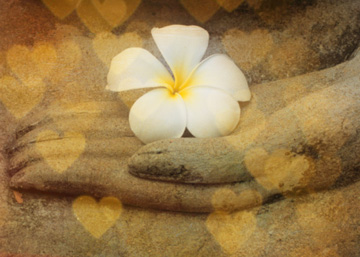Cultivating Compassion
Kindness, benevolence and compassion are some of universal human values and an important part of a balanced personality and character. This article contains a Buddhist system of meditation which can help us in enlarging our heart and a story which illustrates the need for practicing kindness in our daily life.
Meditation on Universal Benevolence
A passage from a Theravada Buddhist text called as metta meditation.
May all beings be happy and at their ease. May they be joyous and live in safety! All beings, whether weak or strong – omitting none – in high, middle or low realms of existence, small or great, visible or invisible, near or far away, born or to be born – may all beings be happy and at their ease! Let none deceive another, or despise any being in any state; let none by anger or ill-will wish harm to another! Even as a mother watches over and protects her child, her only child, so with boundless mind should one cherish all living beings, radiating friendliness over the entire world, above, below and all around without limits; so let him cultivate a boundless goodwill towards the entire world, uncramped, free from ill-will or enmity.
Metta is a singularly vital practice in the giving forth of universal love. Metta is not an exercise in charity or in sentimental good will; it does not deal in fuzzy abstractions. A directed dynamic suffusion of one’s whole being with active love and benevolence, it entails not only the deliberate creation of such a state of being but the power to send forth, from one’s innermost center, unfailing compassion, concern and loving-kindness.
Some years ago I attended a Buddhist seminar in Roe Hampton, England. Our instructor in the morning meditation was a revered teacher from Colombo whom I had met not long before on a trip to Sri Lanka. This noted teacher had come to London from his beautiful tropical island to help establish a Buddhist practice center, in a cold, noisy, damp and at that time – very polluted city.
The subject this gentle little sage gave us for our early morning meditation was metta. His instructions were direct and specific. To begin with, we were to extend love to ourselves, since if we could not love ourselves we surely could not love anyone else. From ourselves we were to move our feelings of good will and benevolence outward, including all those in the room with us, to distant relatives and friends (not, however, with any sentimentality or possessiveness); moving ever out and out, without losing concentration, we were to include all those less well known or who “meant nothing to us,” to total strangers, and finally to our enemies. We were, in short, asked to suffuse our entire beings with the dynamic force of metta and project it outward from our own centers until it embraced the whole universe. There was nothing simple, simple-minded or abstract about this demanding daily exercise. Under our instructor’s quiet tutelage I believe most of us became aware of metta’s inherent dynamism and power.
By the end of the seminar it must have been clear to any thoughtful person that if one could learn how really to practice metta, problems with the ego would begin to disappear. This particular Buddhist exercise is designed to teach the practitioner not to separate himself from the rest of humanity.
– Nancy Wilson Ross
Practice of Kindness
(A story which illustrates how to inculcate kindness in the young.)
A King of ancient India came to his Guru with his prince, a young boy. He told his Guru,
“Sir, this boy is going to inherit my kingdom after me. I request you to give him a suitable education which will make him a good king.”
The Guru said, “Yes, you leave your boy with me and come back after six months. I will train him to be a good king.”
The next day, in the morning, Guru told many stories on kindness, generosity and compassion to the boy and said to him, “My dear child, now you go out and wander around in the city. Look for as many opportunities as possible to put into practice what you have learnt from the stories. You should not come back home without doing atleast a few acts of kindness. You will do this everyday. This will be your education for the next six months.”
Thus, everyday after listening to stories on kindness from his teacher, the young prince went out into the world and found many occasion to be kind and helpful to others. After six months the King came back to his Guru and asked, “Sir is my son ready to be a good king.” The Guru said: “Yes you can take your son back. He will be a great king because he has developed a kind and compassionate heart. He will not run after power or wealth for himself because a compassionate heart cannot be greedy. Whatever wealth or power he has or acquires, he will use it for the well-being of his subjects.”
– Nivas

